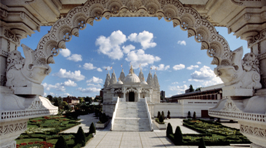RB
RE
Curriculum Intent
Religious education enables children to investigate and reflect on some of the most fundamental questions asked by people. At Gateway Academy we develop the children’s knowledge and understanding of the major world faiths, and we address the fundamental questions in life. At Gateway Academy, we develop the children’s knowledge and understanding of the major world faiths.
We want children to:
- develop an awareness of spiritual and moral issues in life experiences
- develop knowledge and understanding of Christianity and other major world religions and value systems found in Britain
- develop an understanding of what it means to be committed to a religious tradition
- be able to reflect on their own experiences and to develop a personal response to the fundamental questions of life
- develop an understanding of religious traditions and to appreciate the cultural differences in Britain today
- develop investigative and research skills and to enable them to make reasoned judgements about religious issues
- have respect for other peoples’ views and to celebrate the diversity in society
The Curriculum
Our school curriculum for religious education meets the requirements of the 1988 Education Reform Act (ERA). The ERA stipulates that religious education is compulsory for all children. Parents do have the right to withdraw their children from RE lessons. Should any parent wish to exercise this right they are asked to speak to Mrs Cleary and Mrs Breslin (co-heads).
At Gateway, RE is taught within the framework of the locally agreed syllabus, which is currently Living Difference III.
This “seeks to introduce children and young people to what a religious way of looking at and existing in the world may offer in leading one’s life, individually and collectively. It recognises and acknowledges that the question as to what it means to lead one’s life with such an orientation can be answered in a number of qualitatively different ways.”
The children are taught RE through concepts that are familiar to them. This provides the children with an opportunity to reflect on the learning within their own lives and experiences, even if they do not practise the focus religion. We follow a five step Cycle of Inquiry (Communicate, Apply, Enquire, Contextualise, Evaluate) and explore concepts with the children from their first-hand experience before applying them to religious ideas. Concepts such as Celebration, Belonging, Ritual and Authority are explored in our curriculum.
Our school community has a range of different cultures and faiths and we welcome opportunities to learn about these from the children.
Early Years Foundation Stage (EYFS)
For children in the Foundation Stage, RE teaching is integrated in the Early Learning Goal relating to Knowledge and Understanding about the World. Children learn about basic themes such as celebration, new life and family and explore these concepts within different religions, primarily through storytelling and class discussion.
Key Stage 1 (Years 1 and 2)
In Key Stage 1, RE is taught distinctly on a weekly basis. Children learn about concepts such as ‘change’, ‘special’, ‘belonging’, and ‘ritual’, by considering their own experiences of these themes and then relating these ideas to religious contexts. For example, in Year 1 children learn about special people in their lives and then relate this to special figures in different religions. Christianity and Judaism are the main religions taught within this Key Stage, although there are links made with Islam and Hinduism.
Key Stage 2 (Years 3 to 6)
In Key Stage 2, RE lessons are also taught weekly. Children are introduced to key elements of a wider range of religions, including Islam, Hinduism and Buddhism, and world views such as Humanism. Children learn about religious concepts that they have met in KS1 in more detail as well as engaging with more challenging concepts such as Justice, Peace and Rites of Passage.
The curriculum overview for the school is as follows:
|
HT1 |
HT2 |
HT3 |
HT4 |
HT5 |
HT6 |
|
|
1 |
Belonging |
Celebration (Passover) |
Learning from Stories |
Remembering |
Special (Places) |
Authority |
|
2 |
Celebration (Harvest) |
Symbol (Light) |
Ritual (Water) |
Special (Books) |
Creation |
Stewardship |
|
3 |
Belonging |
Neighbour |
Message |
Ritual (Food) |
Holy (places) |
Devotion |
|
4 |
Ritual (Sukkot) |
Holy (Mary Mother of God) |
Interpretation |
Sacrifice (Eid-ul-Adha) |
Jesus as Divine |
Imagery (Angels) |
|
5 |
Rites of Passage |
Identity |
Enlightenment |
Samsara |
Ceremony (Death) |
Justice |
|
6 |
Good and Evil (Diwali) |
Power |
Authority (The Torah) |
Resurrection |
Peace |
A Good Life |
Recent Projects
Year 5 trip to Neasden Temple
This week pupils from Year 5 visited the largest Hindu Mandir outside of India. Neasden Temple is located near Wembley Football Stadium and was opened in 1995. The children were given a guided tour of one of the most stunning religious buildings in London.

 Gateway Academy
Gateway Academy